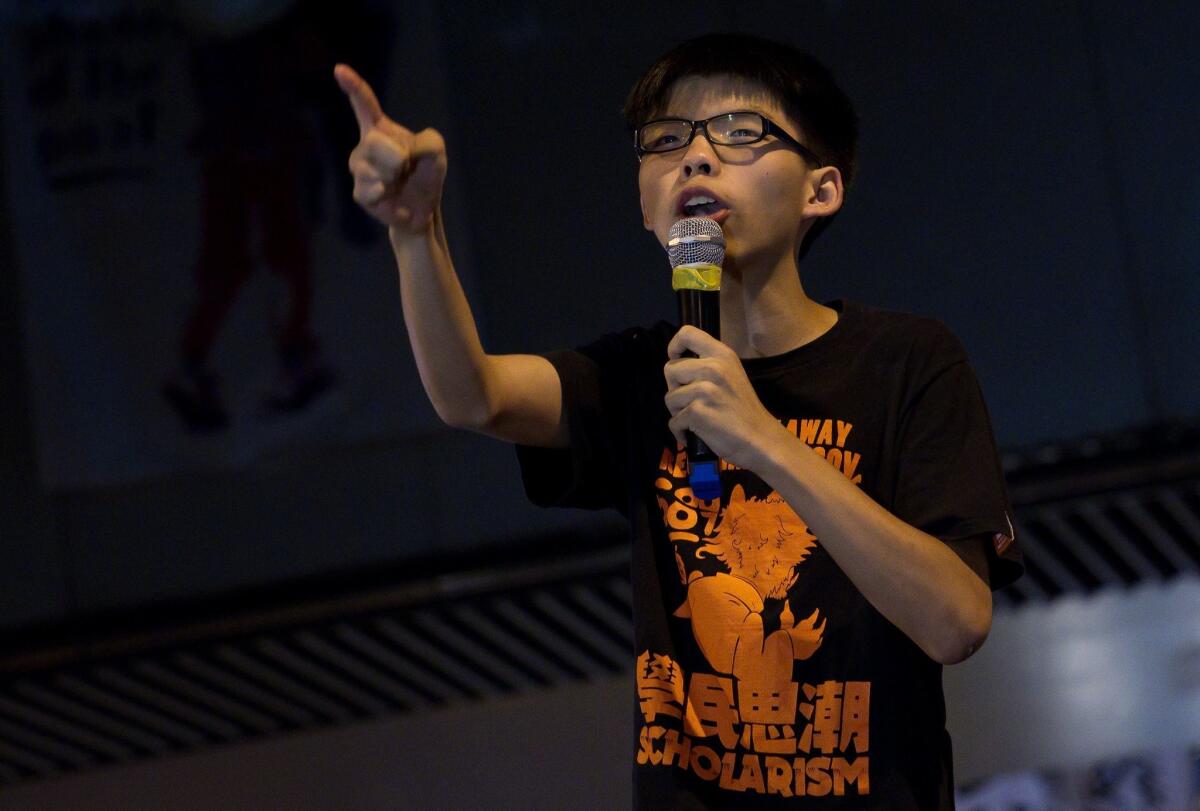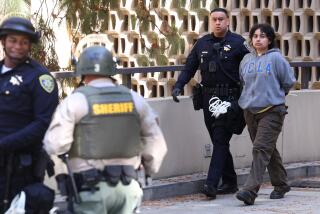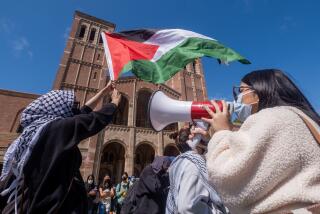Hong Kong student protest leader Joshua Wong: ‘We will win’

By his own admission, Joshua Wong isn’t physically intimidating.
An unlikely hero of last year’s Hong Kong protests demanding free elections, the slender 18-year-old with a bowl haircut and black-framed glasses laughs off Beijing propagandists’ claims that he is in Los Angeles this week for military training by his U.S. paymasters.
“Some people in mainland China might think I get funding from the U.S. government, but I don’t think anyone believes I have come here for army training,” the diminutive protest leader said with a laugh, spreading his scrawny arms to emphasize their dearth of muscle. “To get training like that, I’d have to be a lot stronger and taller.”
Clumsy attempts by China’s communist government to cast protesters as Western puppets work to the advantage of Hong Kong’s democracy supporters, Wong said, because they expose the tactics to which the ruling party will stoop, eroding its credibility, especially with young people.
“As in every movement, the more mistakes the government makes, the more chances we have to get support from the general public,” Wong said in an interview during his week-long visit to Los Angeles. He was invited here by UCLA to take part in a seminar on democracy movements.
Wong, a co-founder of the student protest group Scholarism, became possibly the best-known face of the so-called umbrella protests that brought parts of Hong Kong to a standstill for nearly three months last year.
For Wong, the election protests were only the latest chapter in a youth spent organizing on Hong Kong’s crowded streets, beginning with demonstrations he joined at age 13 against a proposed high-speed rail line linking Hong Kong to the mainland. At 15, he helped rally more than 90,000 demonstrators against a new “patriotic education” curriculum that extolled the virtues of one-party rule and branded democracy as a path to chaos.
Hong Kong citizens enjoy broader rights and freedoms than their mainland countrymen under the “one country, two systems” principle that has guided political reintegration of the former British territory since its return to Chinese rule in 1997.
Heavy-handed efforts by the Communist Party leadership to weaken Hong Kong’s autonomy have galvanized protest, Wong said.
But standing up to authorities’ attempts to assimilate Hong Kong into the mainland’s monolithic power structure exacts a toll on those brave enough to join the protests, and on those who care about them.
“My parents support my stand, but they wouldn’t join the protests or go to demonstrations. My mother, being a mum, gives me space to join this movement, but she worries,” Wong said.
He recalled his mother’s early entreaties to not expose himself to the physical dangers of tear gas and truncheons or the potential career setbacks of prison or expulsion from his studies in politics and public administration. Wong said he barely made it into the Open University, the least prestigious of Hong Kong’s nine institutions of higher learning.
Wong is aware of the anguish his activism causes his parents, but also appreciative of their recognition of its importance to him. He recalled an incident in which the mother of a fellow protester grabbed her daughter’s cellphone while she was in the shower and deleted all movement contacts and messages.
The 74 days of protest that began in September were sparked by Chinese leaders’ disclosure that elections to choose a chief executive for the territory in 2017 would be limited to two or three candidates vetted by a 1,200-member communist-allied committee and their ideological mentors in Beijing.
“We hope to get the Legislative Council to reject the whole package announced by the government, which calls it ‘one-person, one-vote’ but only pro-government candidates can run,” Wong said. “Imagine if it was said in this country that only Democratic Party candidates could join the election. Would anyone think that was a free vote?”
During the fall protests in Hong Kong, isolated attempts by mainland Chinese activists to show support led to their arrests, and state-controlled media ensured an information blackout on the events, which might have stirred mainlanders’ memories of the brutal crackdown on democracy proponents at Beijing’s Tiananmen Square in 1989.
Wong said he holds out little prospect of the territory’s movement spreading to the mainland any time soon. The Hong Kong activists’ strategy, he explained, is to gain free elections in the territory first, which he predicts will lead to the election of a reform-minded figure to replace Hong Kong’s Beijing-allied chief executive, Leung Chun-ying.
Success in Hong Kong could eventually provide inspiration and momentum for like-thinking movements on the mainland. Even the Hong Kong movement faces an uphill battle to break the business elite’s allegiance to the status quo, he said.
“The ruling class, the rich people in Hong Kong, have gained quite a lot under this unequal system. If we try to change rule from unequal to equal, it will eliminate their benefits, so they oppose that,” Wong said. He added that many middle-class people remain silent for fear that protest will dash their chances of getting ahead.
Some fear, though, that as long as the political challenge remains limited to Hong Kong, authorities will have the latitude to bring in police from the mainland to augment territorial forces if the next phase of protests disrupts business and transportation — the pretext used for crushing the protests last year.
Police swept out the last of the holdouts of the Occupy Central With Love and Peace movement on Dec. 11, arresting Wong and other leaders who still face prosecution and unknown punishment.
“I was arrested three times and have eight charges against me. The risk of going to jail is a big pressure for us and our families,” he said. “But for a movement to be successful, someone needs to pay the price.”
His fellow democracy advocates stand ready to return to the streets of the financial district, known as Central, when the election proposals come to the floor of the Legislative Council, probably sometime this spring, Wong said.
The Hong Kong government had promised negotiations with the protest leaders to find a compromise on the mechanics of local elections but haven’t agreed on any proposed dates to meet, Wong said.
“From the first of this year until now the government has rejected all of our requests,” Wong said. “We hope that this shows the public that the problem is not from the students but from the ruling class.”
With no talks on offer, democracy advocates are increasingly convinced they will have to take to the streets again, hopefully bolstered by those who took the government at its word that negotiations were the appropriate forum for pushing reform.
“No one won and no one lost this battle,” Wong said of the two-month standoff. “And we still believe that we will win the war.”
Follow @cjwilliamslat for the latest international news 24/7
More to Read
Sign up for Essential California
The most important California stories and recommendations in your inbox every morning.
You may occasionally receive promotional content from the Los Angeles Times.










